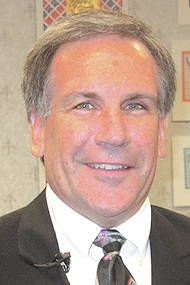
Over the last few weeks, local news articles have been reporting on school treasurers presenting the state mandated five-year financial forecasts to their boards of education. As I have read the articles, I have been reminded that in a sea of ridiculous laws governing public education, the law requiring school treasurers to submit a five-year forecast without much of the information necessary to perform such a task stands out as one of the dumbest.
In my former role as superintendent of the Miami County Educational Service, I have worked closely with many school treasurers, and they are highly competent, honorable, dedicated men and women who take their responsibility of managing their districts’ finances seriously. Because of my respect for them, it saddens me when they are placed in no-win situations as this law does.
Why do I say that? To complete any meaningful financial forecast, particularly one that requires treasurers to accurately predict five years into the future, they must have confidence that the dollar amounts they have at their disposal are as concrete as possible. But, because of the way schools are funded, they can’t be confident in what they know.
For example, Miami County school districts receive a significant percentage of their funding from the state through its budget. But, the legislature adopts its budget biennially, which means school treasurers know their state funding amounts for, at most, a two-year period. The state won’t officially approve its budget for next year until later this summer and after treasurers are required to submit their forecast, which means they don’t even know their districts’ state funding allotment for next school year, let alone for five years from now.
Without this necessary data, how, pray tell, are they supposed to forecast their districts’ financial position with any degree of accuracy?
Similarly, many school districts have a local levy (or levies) on the ballot during any given five-year period which may generate millions of dollars of revenue on which they rely to fund their district. Are school treasurers supposed to create their forecasts as if those levies will automatically pass? What if they fail? Local levy elections, the results of which treasurers cannot possibly know, are integral information to have for any forecast to be accurate. But, they don’t have it.
So, school treasurers don’t know how much money their districts’ two most important revenue streams will provide in one year, let alone for five years, yet they are expected to submit an accurate forecast for five full years.
Expenses are every bit as volatile. For example, in this year’s reports, most district treasurers have referred to an incredibly large increase in health care costs for year one of their plan. Next year’s increase has commonly been from 15 to 26 percent, which is enormously high and is an unexpected amount for a single year. Yet, they are expected to accurately predict the increases for years two through five? How, exactly, are they supposed to do that?
What will fuel prices be over the next five years, especially considering they may increase 40 cents in a single day? What about other utilities’ costs, or expenses for supplies, or personnel costs, particularly for districts engaged in negotiations with their staff? How in the world are they supposed to accurately predict those numbers with any degree of certainty?
So, school treasurers are required to stake their reputation on creating a five-year financial forecast despite, through no fault of their own, not having access to the relevant dollar amounts needed to make their predictions.
What could possibly go wrong with this scenario, besides everything?
Try doing this for your own household budget. Go ahead and predict what your revenue and expenses will be five years from now. In fact, make your predictions for every one of the next five years. Then feel free to post them online for the world to see, and see how that works out for you.
Sadly, I have watched the personal and professional reputations of outstanding treasurers and the superintendents with whom they work destroyed when they can’t accurately perform this impossible task. When their predictions don’t work out perfectly, they are invariably labeled as incompetent, crooked, or both while being publicly vilified for “failing to live within their means.” It is a theme that has repeated itself over and over again.
But, it’s hard to live within your means when you don’t know for sure what your means are.
The most disgusting part of this is the people who have created this ridiculous expectation, our state legislators, remain strangely silent when highly competent individuals have their reputations destroyed for being unable to accurately perform an impossible task.
How magnanimous of them.
Tom Dunn is a former superintendent of the Miami County Educational Service Center.


